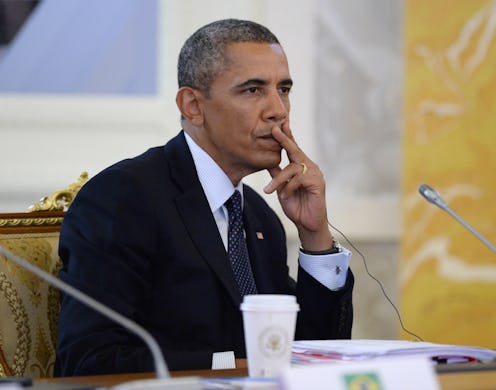News
Obama Gains Symbolic Support For Syria Strike
President Obama has spent the week in Europe attending the G-20 summit and looking for support for a punitive strike in Syria — both at home and overseas.
And it looks like that effort is beginning to pay off.
On Friday, the White House released a joint statement on Syria signed by 10 countries: Australia, Canada, France, Italy, Japan, South Korea, Saudi Arabia, Spain, Turkey and the United Kingdom. While the statement does not mean these countries will also use force to initiate a punitive Syria strike, the above countries say they agree to the following:
We call for a strong international response to this grave violation of the world’s rules and conscience that will send a clear message that this kind of atrocity can never be repeated. Those who perpetrated these crimes must be held accountable...
We commit to supporting longer term international efforts, including through the United Nations, to address the enduring security challenge posed by Syria’s chemical weapons stockpiles. Signatories have also called for the UN fact finding mission to present its results as soon as possible, and for the Security Council to act accordingly.
We condemn in the strongest terms all human rights violations in Syria on all sides. More than 100,000 people have been killed in the conflict, more than 2 million people have become refugees, and approximately 5 million are internally displaced. Recognizing that Syria’s conflict has no military solution, we reaffirm our commitment to seek a peaceful political settlement through full implementation of the 2012 Geneva Communique. We are committed to a political solution which will result in a united, inclusive and democratic Syria.
Some headway has of course also been made domestically, with the Senate Foreign Relations Committee passing a resolution for action.
Speaking to the press Friday, Obama said that world leaders had talked extensively about Syria during the summit. According to the president, heads of state are becoming more aware that "the world cannot stand idly by" as Syria uses chemical weapons. "It's clear that there are many countries that agree with us that international norms must be upheld," he said.
When asked if he would act even without Congressional approval Obama said (obviously very politically), "It would be a mistake for me to jump the gun and speculate because right now I'm working to get as much support as possible out of Congress."
As the U.S. inches closer to a decision on striking Syria in response to weapons attacks, the State Department is telling U.S. citizens to get out of Lebanon, which serves as a home base for Bashar al Assad ally, Hezbollah.
Meanwhile on Friday, the State Department ordered all "non essential personnel" and American citizens to leave Lebanon, citing security concerns, as tension over a potential strike in Syria mounts.
Tensions rose even further as Russia, a staunch supporter of Syria's government, sent naval ships to the Mediterranean Sea, increasing fears that a U.S. strike on Syria will lead to a much larger international brawl. On Thursday, Putin even suggested that an attack on Syria by the U.S. could lead to a nuclear war.
A new proposal in the Senate may help. It would forestall a potential strike and give Syria 45 days to sign an international chemical weapons ban. During the 45 days, the president would have to submit a plan for action in Syria to Congress, and exhaust all options when it comes to building an international support group.
According to reports by the Associated Press, the U.S. government is considering expanding the current training of the rebels conducted by the Central Intelligence Agency in Jordan. The transferring of the training program to the military would allow the U.S. to ramp up lessons on communications equipment and weapons, which are so far provided by other Gulf states. Expanding the rebel training program would appease some in Congress, like Senator John McCain, who have called for more to be done to help Syria's opposition forces.
In June, President Obama said that the U.S. would help arm Syria's rebels, but thus far, nothing has come of it.
Meanwhile, scrutiny of Syria's rebels is increasing. The Syrian government sent security forces to a Christian town north of Damascus on Friday to help repel rebels. Opposition forces, allegedly headed by an al Qaeda faction, entered the area on Wednesday and then again on Thursday, increasing fears about extremism within the ranks of the rebels. The debate over extremist involvement in rebel troops came to the forefront of the conversation in Syria earlier this week when video of rebels brutally executing prisoners leaked, and Russian President Vladimir Putin called Secretary of State John Kerry a "liar" for downplaying the presence of extremists within the rebel ranks.
